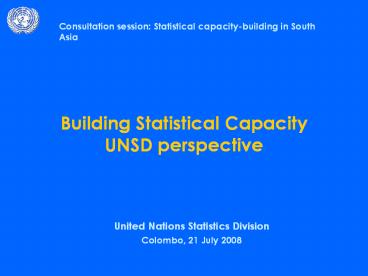Building Statistical Capacity UNSD perspective - PowerPoint PPT Presentation
Title:
Building Statistical Capacity UNSD perspective
Description:
UNSD Technical Cooperation (1) Long history of successful TCP ... Promoted through the co-financing of pilot activities by partners ... – PowerPoint PPT presentation
Number of Views:15
Avg rating:3.0/5.0
Title: Building Statistical Capacity UNSD perspective
1
Building Statistical CapacityUNSD perspective
Consultation session Statistical
capacity-building in South Asia
- United Nations Statistics Division
- Colombo, 21 July 2008
2
Statistics Division Mission
UNSD TCP
National level
International level
Result-based Management and Policy
Decision-making In a Sustainable Manner
Solid Global Statistical System
Strong National Statistical Systems
3
UNSD Technical Cooperation (1)
- Long history of successful TCP
- Integral part of the Divisions work programme
- Related to UNSD work on setting international
statistical standards - Positive feedback from Member states
4
UNSD Technical Cooperation (2)
- Statistical Commission has repeatedly emphasized
that technical cooperation efforts need to be - Nationally owned
- Demand driven and tailored to the local needs
- Effectively coordinated among the various
international donors
5
UNSD Technical Cooperation (3)
- Monitoring of MDGs has increased the demand for
official statistics - Attention to shortcomings in the availability of
statistical data - Urgency for statistical capacity-building efforts
6
Sources of assistance to support statistical
development
- Regular programme for technical cooperation
- Interregional Advisers
- Fellowships
- Training workshops
- UN Development Account
- External budgetary projects and trust funds
7
Regular Programme for Technical Cooperation
- Interregional advisers
- Environmental-economic accounting
- Population and housing censuses
- Fellowships
- 2007 22 fellowships in the area of Organization
of NSS, energy, environment, economic statistics,
MDGs, etc. - 2008 13 fellowships in the area national
accounts, IT, informal economy, etc. - Training workshops
- Workshops about 20 per year for 2007 and 2008
(planned) in all statistical domains - Meetings of the UN Expert groups on MDGs, NA,
Industrial and DTS statistics, Tourism
statistics, Merchandize statistics,
Classifications, Population and housing census
8
UN Development Account (1)
- Integral part of the technical cooperation
activities of the economic and social entities of
the UN under the umbrella of the Executive
Committee for Economic and Social Affairs
(EC-ESA) - DA projects aim at capacity-building through
sub-regional, regional and interregional economic
and technical cooperation among developing
countries - Projects serve as a natural extension to the
normative and policy activities of the
implementing agencies in their follow-up the
United Nations conferences and summits in
economic and social affairs - The Under-Secretary-General for Economic and
Social Affairs acts as Programme Manager of the
Account
9
UN Development Account (2)
- The General Assembly established that Development
Account projects should - Demonstrably strengthen national development
capacity ensuring project sustainability - Use information and communications technology
and networking of expertise - Use partnerships and South-South cooperation
10
UN Development Account (3)
- DA projects sustainability
- Ensured through consistent and proactive
involvement of stakeholders in project design and
implementation - Promoted through the co-financing of pilot
activities by partners - Information and communication technologies
- Core of many DA projects because of their
multiplier potential and adaptability to
development activities beyond the project scope
11
UN Development Account (4)
- Networking
- Importance of building knowledge networks
supported by information and communications
technologieswhich allow countries directly to
access information on good practices - Capacity-building through networking of local
expertise offers collaborative opportunities,
often beyond those originally envisioned by
project designers - Can create additional regional and interregional
links conducive to capacity-building in specific
fields, thus leading to requests for further
networking and technical assistance
12
UN Development Account (5)
- Partnership and South-South Cooperation
- The DA supports the creation and strengthening of
development partnerships between the United
Nations and outside institutions - 80 of projects are executed by more than one
entity and often in collaboration with other UN
entities - Many projects engage regional organizations and
local, regional, and/or international
non-governmental organizations - All projects emphasize exchange of experience and
cooperation activities among developing countries
within and outside the region
13
Building Statistical Capacity -the challenges
- Ensuring the availability of necessary statistics
and indicators for monitoring progress towards
the Internationally Agreed Development Goals in
the short-term - Nationally monitoring reports as important
advocacy tool for strengthening statistical
capacity - Internationally indicators are available to
promote and inform the debate on MDGs and the
International Goals - Developing sustainable statistical systems in
countries
14
Building Statistical Capacity -the way forward
- The responsibility for building national
statistical capacity primary lies with the
national governments - Building and sustain the statistical capacity in
the long run - Institutional context
- Human and capital resources
- External support in the form of coordinated
bilateral or multilateral agreements can make an
important strategic contribution towards the
long-run goal - Temporary in nature
- For highest possible impact should be focused on
specific achievable objectives - Sharing of best practices
- Transfer of technical expertise to strengthen the
knowledge
15
- Thank you































